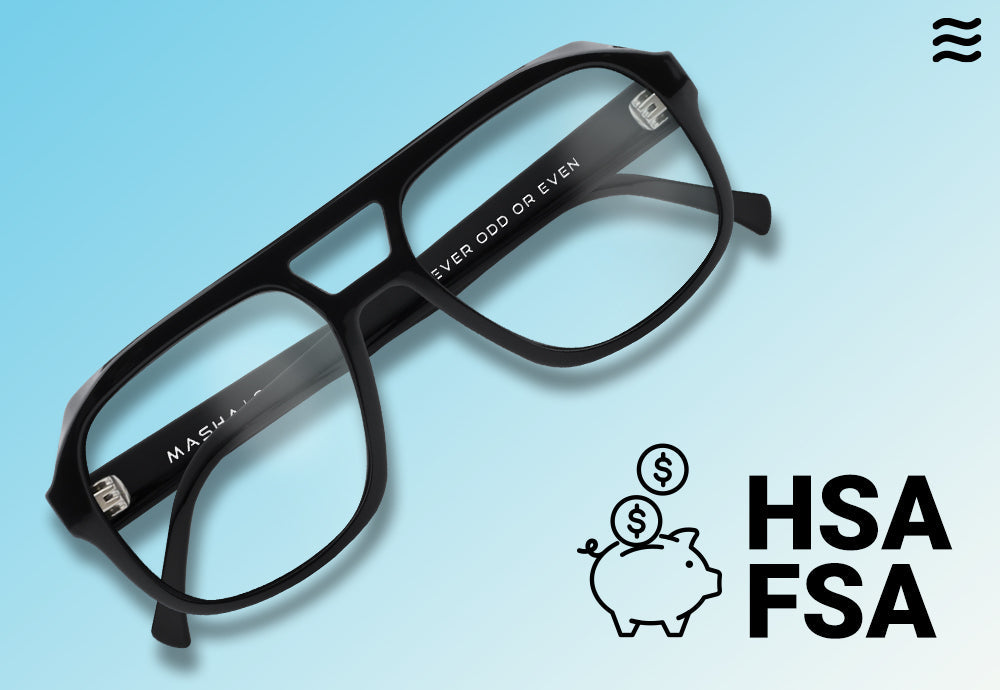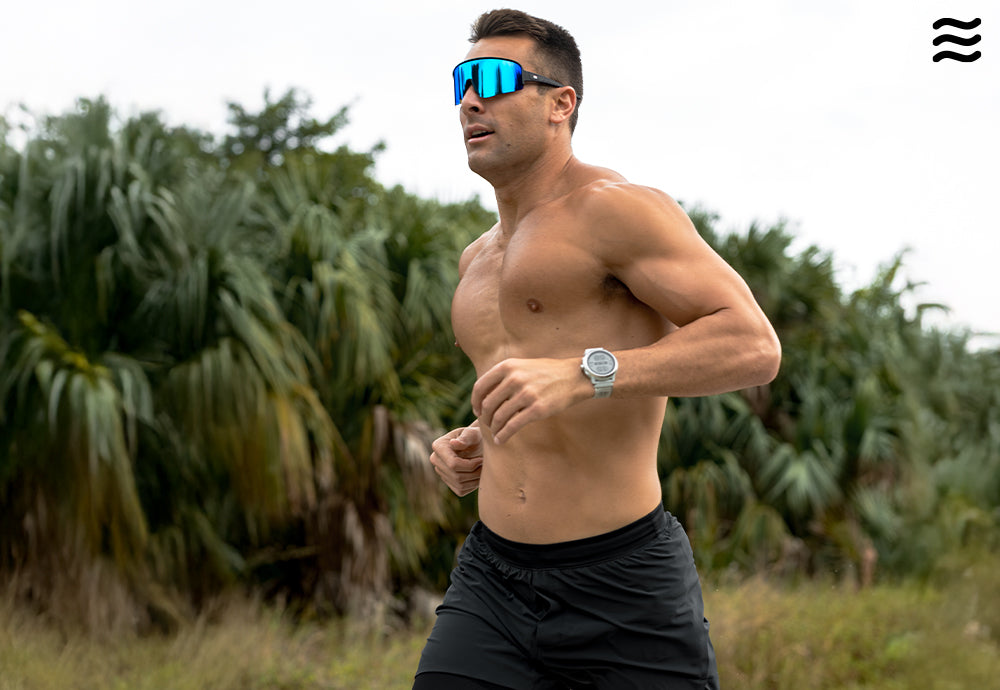
If you’ve ever wondered, ‘What are polarized sunglasses?’ the answer is really simple: they are sunglasses that use a special filter to block that harsh, blinding reflected light you get from flat surfaces like roads, snow, and the water's surface.
The best polarized sunglasses do three things at once: they reduce glare, sharpen contrast, and reduce eye strain, making even the brightest sunlight much easier on your vision. But that’s not all you should look out for in sunglasses. The top polarized sunglasses combine amazing glare control with UV400 to block those harmful UV rays and protect your long-term eye health.
This blog post will walk you through exactly how polarized sunglasses work, explain the main difference between polarized vs non-polarized sunglasses, and even teach you how to test for genuine quality. By the end, you'll be able to make an informed decision on your next pair of polarized shades.
What Are Polarized Sunglasses?
Polarized sunglasses use a thin, specialized filter, right inside the lens. This filter acts like vertical blinds, blocking harsh horizontal light rays that come from horizontal surfaces, such as roads, snow, water, and glass.
Glare is strongest when sunlight reflects at a low angle, and polarization is most effective at filtering this type of reflected light. This filtering process reduces glare from the sun as it hits a reflective surface, such as a windshield or the water’s surface. This provides you with much sharper clarity and less eye strain in bright conditions and on sunny days.
The Benefits of Polarized Sunglasses
The comfort you get from polarized shades is immediate:
-
Less Squinting and Fewer Headaches: Polarized lenses filter blinding horizontal light rays, but they still allow vertical light through for clear vision. This reduces strain on the eyes and keeps you focused and safe.
-
Cleaner Details on Reflective Surfaces: Things like windshields, chrome, and the water's surface are instantly easier to see through.
-
Easier to See When Driving or Cycling: Crisp edges and improved contrast mean you have quicker reactions in bright light.
-
Better Color and Depth Perception: Polarized glasses improve depth perception, which is super helpful when you’re near snow, water, or trails.
-
More Relaxed Eyes Outdoors: Even on long sunny days, your pair of polarized sunglasses reduces glare and keeps your eyes comfortable.
Our Top Picks For Polarized Sunglasses
At Neven Eyewear, we make it easy to find a great pair of polarized sunglasses that works for you. That’s right – we’ve got you covered. Here are a few top picks:
1. Stormy XL

Our Stormy XL sunglasses are sharp, bold, and full of power. With green tinted lenses, these are sure to be a stand-out option amongst polarized sunglasses.
Shop our Stormy XL sunglasses here.
2. NYC

Feel the rhythm of the city around you in our NYC sunglasses - slick and sophisticated, just like a New Yorker. Plus, polarized lenses to keep your eyes safe, no matter what you’re tackling that day.
Shop our NYC sunglasses here.
3. Gaia

This pair of super-cool aviators has a rounded edge and a versatile style that makes it great for everyday use. They’re polarized sunglasses with 44.34% light transmission and UV400 protection.
Shop our Gaia sunglasses here.
4. Jaguar

These sunglasses feature a large, glossy tortoise-shell rectangle frame made from durable TR90 materials, boasting black polarized UV400 lenses and cool, rock 'n' roll-inspired details. Also comes in XL.
Shop our Jaguar sunglasses here.
5. Ethereal

The Ethereal are striking, medium-sized cat-eye sunglasses from our Coven Collection, featuring glossy purple/black gradient frames and black polarized UV400 lenses for a mysterious, edgy aesthetic.
Shop our Ethereal sunglasses here.
6. Quinn

Our Quinn sunglasses feature a chic, small-sized black frame with matte pink metal arms, upgraded hinges, and polarized pink/champagne UV400 lenses for a super stylish, bold look.
Shop our Quinn sunglasses here.
7. Saint

Our Saint sunglasses feature small, vintage-inspired round frames with a sleek black metal finish and black polarized UV400 lenses, paying homage to the free-spirited style of Penny Lane from Almost Famous.
Shop our Saint sunglasses here.
Polarized vs. Non-Polarized Sunglasses
When you’re choosing between polarized and non-polarized sunglasses, the main difference lies in how each type handles glare and provides that overall visual clarity you need. You need to understand the difference between polarized and non-polarized lenses to choose the best option for your specific needs. So you can stay protected – no matter what.
Glare Reduction
-
Polarized sunglasses work by using a specialized filter that blocks horizontal light rays from horizontal surfaces like roads, water, and snow. This is how they reduce glare and eye strain. The filtering action of polarized lenses is especially effective at reducing intense sunlight and glare, making them ideal for the great outdoors.
-
Non-polarized sunglasses use simple dark lenses that only reduce brightness. They don’t cut the glare, so light from a reflective surface can be distracting.
Clarity and Comfort
-
Polarized lenses offer sharper detail, stronger contrast, and cleaner colors, making bright sunlight easier on your vision.
-
Non-polarized lenses give less clarity in bright conditions, often leaving your eyes tired after everyday use outdoors.
Safety in Bright Light
-
Polarized counterparts improve hazard detection when driving, cycling, or working with heavy machinery, as glare is minimized.
-
Non-polarized shades can leave you squinting on sunny days, causing you to miss small details on the road or in icy conditions.
Screens and Technology
-
Polarized glasses can sometimes dim LCD screens or digital screens at certain angles, though tilting the screen usually fixes it.
-
You trade screen visibility for constant glare from the sun and other surfaces.
Overall Use Case
-
Polarized sunglasses are ideal for driving, fishing, snow sports, and anyone who spends long hours outdoors.
-
Non-polarized sunglasses suit wearers who prioritize style or those rarely exposed to harsh reflected light.
UV Protection vs Polarization (Know the Difference)
The difference between polarized and UV protection is often confused, so let’s be clear:
-
UV protection blocks invisible, harmful UV rays that damage eye health.
-
Polarization filters visible horizontal light rays from horizontal surfaces to reduce glare.
Cutting reflected light can improve visual clarity in polarized sunglasses. It can also reduce eye strain and make bright conditions more comfortable. We recommend investing in a pair of polarized sunglasses with a UV400 rating, combining glare control with complete protection from damaging rays.
How to Test if Lenses Are Polarized
Testing your polarized sunglasses is simple and helps you spot the main difference from cheap, fake options. These checks prove how polarized sunglasses work compared to non-polarized lenses:
-
Rotate Test: Hold a pair of polarized lenses at a 90-degree angle against another pair of lenses. If they turn nearly black, both are polarized.
-
Phone Screen Test: Hold the sunglasses in front of a smartphone screen in portrait orientation, then tilt it to landscape orientation. True polarized lenses filter the light differently, often dimming digital screens.
-
Shop Light Reflection Test: Wear the sunglasses or hold them in front of a shiny reflective surface like glass or chrome. Real polarization will reduce glare sharply.
Care, Cleaning, and Storage of Polarized Sunglasses
To keep your sunglasses looking fresh and delivering the best clarity, follow these tips:
-
After the beach or a dusty ride, rinse off sand or salt with clean water before wiping.
-
Store your glasses in a microfiber pouch to keep lenses and frames clean between uses.
-
Avoid leaving your glasses on the car dashboard on hot days; heat can warp the frame and harm the lens coatings.
-
You can also use our cleaning kit, which we designed to keep your Neven eyewear clean and looking sharp.
Common Myths About Polarized Sunglasses, Cleared Up
When people compare polarized versus non-polarized sunglasses, a few myths often come up. Let’s set them straight:
-
“Polarized lenses are just dark lenses.” Not true. The main difference is that polarized lenses filter out horizontal light rays, reducing glare as well as brightness.
-
“Polarized means UV protection.” This is another false assumption. UV protection blocks harmful UV rays, while polarization reduces glare from flat surfaces like roads and the water’s surface. You need both forms of protection for your eyes!
-
“Polarized lenses ruin colors.” High-quality polarized glasses keep colors natural and improve contrast, giving you sharper visual clarity in bright conditions.
-
“You can’t see screens at all.” While some LCD screens and digital screens can dim at certain angles, holding the device at a slight tilt usually fixes it. Most sunglasses without polarization don’t reduce glare, and they also don’t offer the same clarity and comfort.
Once you wear polarized sunglasses, the improvement is undeniable.
Frequently Asked Questions
Are Polarized Sunglasses Worth It for Driving?
Yes. Polarized lenses filter horizontal light waves from dashboards, glass, and wet roads, giving sharper contrast and less eye strain than their non-polarized counterparts. Keep in mind, though, that polarized sunglasses aren’t ideal for nighttime driving.
Can I Get Them In Prescription Lenses?
Yes. Many polarized and non-polarized lenses come in prescription form. It’s the best way to protect your vision if you need correction and glare reduction in one pair.
Will They Block Blue Light from Screens?
Not specifically. Polarized lenses focus on cutting glare outdoors, though they may reduce some blue rays. For digital screens, you can get blue-light coatings separately.
Do Kids Need Polarized Sunglasses?
Yes. Children’s eyes are vulnerable to the sun's harmful UV rays. Polarized shades reduce glare and provide lasting eye protection on sunny days.
Why People Love Neven Eyewear
At Neven, we know that the difference between polarized and non-polarized sunglasses is everything. Our polarized lenses filter horizontal light rays to reduce glare, block harmful UV rays, and provide sharper visual clarity than most sunglasses. People choose us because we deliver both comfort and proven eye protection.
Here’s why customers trust us and love our polarized options:
-
Polarized sunglasses help reduce glare from horizontal surfaces, such as water, roads, and snow.
-
Our polarized lenses offer crisp contrast and true-to-life colors, unlike those of cheap, non-polarized lenses.
-
Our frames are lightweight and built for everyday use, whether you need sunglasses for fishing, running, driving, or just for everyday.
-
Our sunglasses have advanced coatings to keep your pair clear of smudges, reflections, and water spots:
-
Oleophobic coating: Resists smudges from oils.
-
Hydrophobic coating: Helps water bead off in rain or near the water's surface.
-
Multiple fits and styles mean our polarized and non-polarized sunglasses work for all face shapes.
-
Our products are backed by a strong warranty and customer-first support, making your next pair of polarized shades a safe, smart choice.
Final Thoughts on Polarized Shades
Choosing between polarized and non-polarized sunglasses comes down to comfort, safety, and long-term eye protection. With polarized lenses that reduce glare, block harmful UV rays, and deliver sharper visual clarity in bright sunlight, you’ll notice the difference from day one. If you’re ready for your next pair, Neven Eyewear offers polarized sunglasses built for style, performance, and lasting eye health.

























































































































































